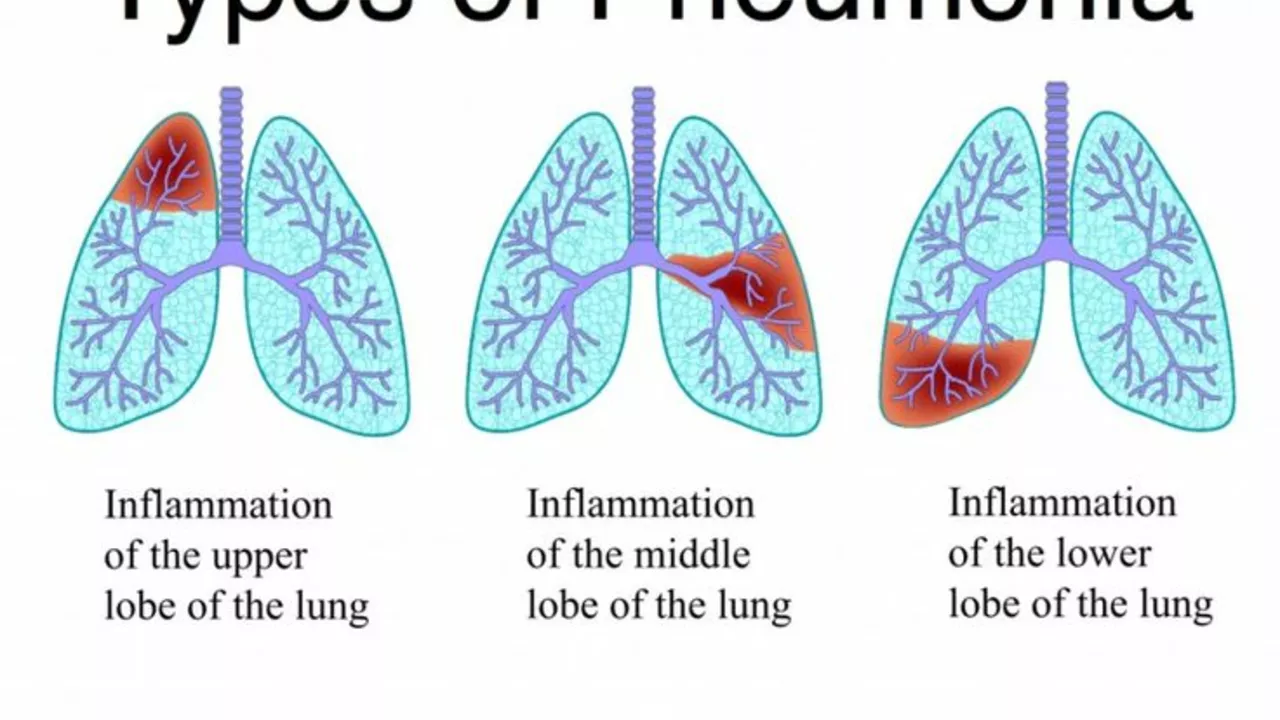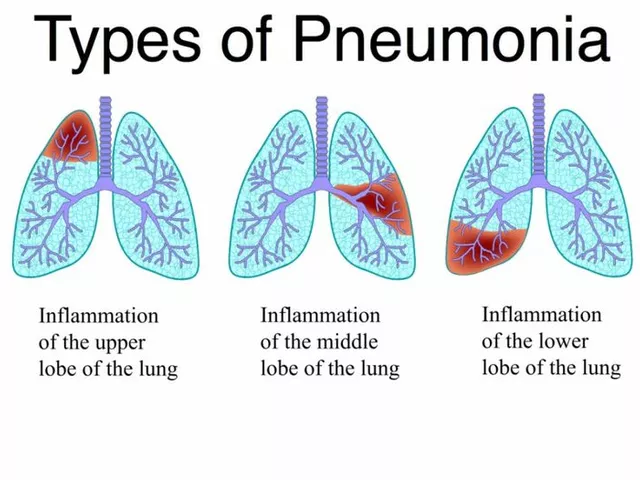How to Manage Pneumonia Symptoms at Home

Understanding Pneumonia
Before diving into how to manage pneumonia symptoms at home, it's vital to understand what pneumonia is and how it affects our bodies. Pneumonia is an infection in one or both lungs that causes inflammation in the air sacs, making it difficult for oxygen to reach the blood. This illness can be caused by bacteria, viruses, or fungi, and it's critical to understand that while some cases can be managed at home, severe cases require immediate medical attention.
Recognizing Pneumonia Symptoms
Identifying the symptoms of pneumonia is the first step towards managing it. Although symptoms can vary from mild to severe, some common signs include cough with phlegm or pus, fever, chills, and difficulty breathing. Other symptoms can include chest pain when breathing or coughing, fatigue, nausea, vomiting, and confusion (particularly in older adults). Remember, if you or a loved one is experiencing these symptoms, it's crucial to seek medical advice promptly.
When to Seek Medical Help
Pneumonia is a serious illness and should not be taken lightly. If you're experiencing severe symptoms such as persistent fever, chest pain, difficulty breathing, or confusion, you should seek medical attention immediately. It's also important to remember that those with underlying health conditions, the elderly, and young children are at a higher risk and may need hospitalization.
Rest and Hydration
When dealing with pneumonia, rest and hydration are key. Your body needs energy to fight off the infection, so getting plenty of sleep and taking it easy are crucial. Staying hydrated will keep your throat moist and help to loosen any mucus or phlegm, making it easier to cough up. Remember to take small sips if you're struggling with nausea or vomiting.
Maintaining Proper Nutrition
Nutrition plays a crucial role in recovery from any illness, including pneumonia. Consuming a balanced diet rich in fruits, vegetables, lean protein, and whole grains can boost your immune system and speed up your recovery. Avoid processed foods and focus on fresh, whole foods as much as possible.
Over-The-Counter Medications
Over-the-counter medications can help manage some symptoms of pneumonia. For instance, cough suppressants can provide relief from a persistent cough, and fever reducers can help manage a high temperature. However, these should not replace medical treatment, and you should always consult your healthcare provider before starting any new medication.
Utilizing a Humidifier
Using a humidifier can soothe irritated airways and help you breathe easier. The moist air can help break up mucus in your lungs, making it easier to cough up. However, it's essential to keep the humidifier clean to avoid introducing any new bacteria or fungi into the air.
Practicing Good Hygiene
Practicing good hygiene can prevent the spread of pneumonia to others in your household. Regular hand washing, avoiding close contact with others, and covering your mouth when coughing or sneezing can help protect those around you. It's also beneficial to clean and disinfect common areas regularly.
Following Up with Your Doctor
Finally, remember to follow up with your doctor. Even if you're managing your symptoms at home and feeling better, it's essential to ensure that the infection has completely cleared up. Your doctor may want to perform a follow-up chest X-ray or schedule regular check-ups to monitor your recovery.


Erica Dello
Take care of yourself and those around you 🌟 proper rest and hydration are non‑negotiable 🙏
sara vargas martinez
Understanding the pathophysiology of pneumonia begins with recognizing that the alveolar spaces become infiltrated with inflammatory exudate, which impairs gas exchange.
This process is not merely a vague inconvenience but a cascade that can precipitate hypoxemia if left unchecked.
Consequently, the first line of defense at home is to ensure adequate pulmonary ventilation through controlled breathing exercises.
Techniques such as pursed‑lip breathing and diaphragmatic respirations have been shown in clinical studies to improve oxygenation.
Coupled with these exercises, maintaining optimal hydration thins secretions, making them easier to expectorate.
A practical rule of thumb is to consume at least eight ounces of fluid every two hours, adjusting for fever‑induced losses.
Nutrition plays an equally critical role; the immune response relies on micronutrients like zinc, vitamin C, and vitamin D, all of which support leukocyte function.
A balanced plate of lean protein, whole grains, and a rainbow of vegetables supplies these nutrients without excess inflammatory fats.
Over‑the‑counter analgesics such as acetaminophen can safely reduce fever, but it is essential to respect the maximum daily dosage to avoid hepatotoxicity.
Cough suppressants should be used sparingly because an active cough helps clear the airways, especially when mucus is thick.
If a humidifier is employed, the water reservoir must be changed daily to prevent secondary bacterial growth, a detail that many overlook.
Good hygiene-hand washing, mask use when coughing, and surface disinfection-helps protect household members, particularly the elderly.
Monitoring clinical signs like increasing shortness of breath, persistent high fever, or new chest pain warrants immediate medical attention.
Follow‑up imaging, such as a chest X‑ray after a week of treatment, is advisable to confirm resolution of infiltrates.
In summary, a disciplined regimen of rest, hydration, nutrition, and vigilant symptom tracking can often keep mild pneumonia manageable at home.
Todd Anderson
Pneumonia, in its ontological essence, represents a breach of the body's equilibrium, a manifestation of microbial intrusion disrupting homeostatic harmony. One must therefore consider not merely the physiological sequelae but the moral imperative to seek timely medical counsel when the disease escalates beyond self‑care. The prudent application of rest, hydration, and evidence‑based pharmacotherapy reflects a rational stewardship of one's health, aligning with the civic duty to preserve communal wellbeing.
Dexter Smith
Statistically, community‑acquired pneumonia accounts for a measurable morbidity burden; therefore, early outpatient management is justified only when objective criteria-stable vitals, absence of hypoxemia-are met.
Cherish Capps
Hey folks, just wanted to say that looking after urself when you’ve got pneumonia is all about staying chill and drinkin plenty of water – it really helps clear out that nasty mucus.
Amy Carpenetti
Balancing rest and gentle activity can keep the immune system engaged while preventing deconditioning the body needs movement for circulation
Paul Griffin
Your comprehensive outline provides an excellent roadmap; I would add that setting a regular sleep schedule-aiming for seven to nine hours-optimizes the body’s reparative processes during recovery.
Michael Tekely
Totally on point, coach. In practice, I’d log sleep metrics in a tracker app and tweak caffeine intake to avoid disrupting REM cycles, which are crucial for immunologic consolidation.
Oscar Taveras
Indeed, a positive mindset can synergize with physiological healing; maintaining optimism has been correlated with reduced hospital stay durations 🙂.
katie clark
One must adhere to evidence‑based protocols lest one devolve into quackery.
Carissa Engle
I cannot stress enough how dangerous it is to underestimate the gravity of pulmonary infection.
Many self‑diagnosed “just a cough” cases spiraled into severe hypoxemia because individuals ignored red‑flag symptoms.
First and foremost, monitor temperature relentlessly; a fever persisting beyond 48 hours signals systemic involvement.
Second, track respiratory rate; surpassing twenty breaths per minute in an adult warrants immediate evaluation.
Third, assess sputum characteristics-purulent, foul‑smelling expectorate implies bacterial colonization requiring antibiotics.
Neglecting proper hydration is tantamount to sabotage; fluid intake should be regimented hourly.
Nutritional adequacy cannot be an afterthought; protein catabolism accelerates during infection, so supplement if appetite wanes.
Over‑the‑counter remedies serve as adjuncts, not replacements for physician‑prescribed therapy.
Humidifiers, when misused, become reservoirs for mold; rigorous cleaning protocols are non‑negotiable.
Hygiene practices extend beyond personal handwashing to include routine disinfection of shared surfaces.
Follow‑up appointments are not optional; they verify radiographic resolution and prevent relapse.
In my experience, patients who disregard these guidelines often experience prolonged convalescence.
Therefore, discipline in adhering to the outlined regimen is indispensable.
Should any doubt arise, err on the side of caution and contact healthcare services without delay.
Remember, proactive management saves lives and preserves quality of life, an undeniable truth that should guide every decision.
Dervla Rooney
Your points are well articulated; I would also emphasize the importance of gradual activity resumption, as gentle ambulation can improve ventilation without overexertion.
Johnny Ha
People don’t tell you that the pharma industry sometimes pushes antibiotics even when a viral cause is likely, so you gotta stay skeptical about the meds they hand you.
Mary Cautionary
While dissenting perspectives can be stimulating, it remains essential to ground therapeutic choices in peer‑reviewed evidence rather than unfounded speculation.